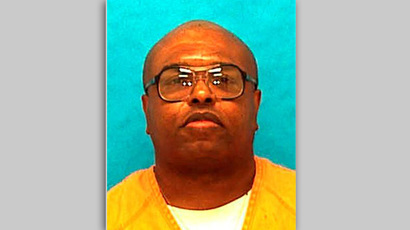Texas executes Mexican national despite diplomatic protests

Texas executed a Mexican national on Wednesday despite warnings from federal officials and foreign diplomats that it could damage the relationship between Mexico and the United States.
Mexico has strongly objected to the execution, arguing that if it went forward, the United States would be violating its responsibility outlined in international treaties.
On Wednesday a prison official announced that the execution would be put on hold while awaiting word from the US Supreme Court on an appeal, which later denied a stay of execution, reported Reuters.
The man in question, 46-year-old Edgar Tamayo, was in the United States illegally at the time of his arrest, when he shot and killed a Houston police officer named Guy Gaddis in 1994. Tamayo was convicted of the crime, but both his lawyers and the Mexican government argue he was never informed of his right to seek diplomatic assistance, established under the international treaty called the Vienna Convention on Consular Relations.
Tamayo’s lawyers claim that if Mexico had been able to intervene in the case sooner, he could have avoided the death penalty. According to the Guardian, his attorneys say revelations about their client’s brain damage and low IQ surfaced too late to be of use in the trial.
About a decade ago, the United Nations’ International Court of Justice ruled that the US should reexamine the convictions of 51 Mexican nationals sentenced to die without being informed of their right to diplomatic assistance. Tamayo’s death would mark the third execution to be carried out, all by the state of Texas.
"If Edgar Tamayo's execution were to go ahead without his trial being reviewed and his sentence reconsidered ... it would be a clear violation of the United States' international obligations,” reads a recent statement by Mexico’s foreign ministry, according to the Los Angeles Times. "The Mexican government opposes the death penalty and is determined to use all available resources to protect those nationals in danger of receiving such a sentence.”
Despite orders by President George W. Bush to review the convictions, Texas argued it was not bound by the treaty. The state’s solicitor general at the time – and now Republican senator – Ted Cruz successfully argued to the Supreme Court that states were not required to carry out the rulings of the ICJ.
In addition to Mexican officials, Secretary of State John Kerry sent a letter to Texas Gov. Rick Perry in December pushing him to reevaluate Tamayo’s execution. Kerry said that, if carried out, it could make it more difficult to assist Americans overseas who get into their own legal dilemmas.
Earlier this month, former Texas Gov. Mark White also joined the chorus against the execution.
“As it stands now, Tamayo will become the first person executed without any review of his Vienna Convention claim,” White wrote in the Austin American-Statesman. “I personally support capital punishment. But this case is not about whether we support or oppose the death penalty. It’s about fairness and having the courts hear all the key facts. In Tamayo’s case, a court review could have made a real difference.”
Before Kerry wrote to Perry, he received a letter from Mexico’s US ambassador, Eduardo Medina Mora, who said Tamayo’s execution could put a significant strain on the relationship between the two countries.
"If carried out, Mr Tamayo's execution will mark the third time that the US has breached its international legal obligations under the ICJ's decision. Should this happen, our whole forward-looking bilateral engagement could be questioned on the grounds of the US inability to live up to its treaty obligations."















